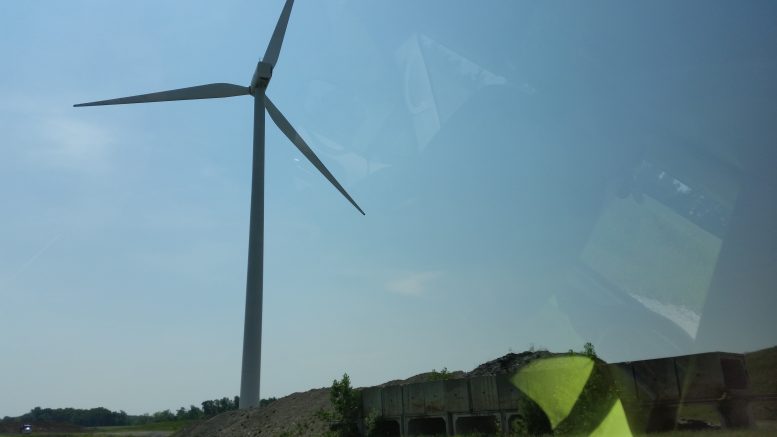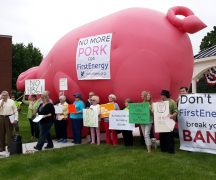By JAN LARSON McLAUGHLIN
BG Independent News
The clock is ticking as Ohio Senator Theresa Gavarone tries to restore some renewable energy efforts into state policy.
But House Bill 6, the so-called “nuclear bailout” bill, has a deadline of June 30 – based on the fact that Davis Besse nuclear power plant needs to order more fuel by that day.
“Everything is on a very short timeline,” Gavarone, R-Bowling Green, said on Monday after she met with several Wood County mayors about multiple issues – topped by concerns about HB 6.
Bowling Green Mayor Dick Edwards is hopeful that Gavarone can get some amendments in the Senate version of the bill that won’t shut out renewable energy efforts.
“To turn our backs on renewable energy is just ridiculous,” Edwards said after the meeting with Gavarone.
“Theresa is not only listening to Bowling Green, but she is trying to do something about it,” the mayor said.
Gavarone, however, is in a tricky position, stuck between a wind turbine and a cooling tower. Her district includes Bowling Green – which has made huge investments in wind and solar power, and it includes Ottawa County – which is the home of Davis Besse.
“They would very much like to see Davis Besse continue,” she said of her constituents in the eastern part of her district.
“It’s a very diverse district,” Gavarone said. “I’m trying to listen and get as much information as possible, so I can understand how that legislation will impact different areas of the district.”
The current version of HB 6 would require every Ohio household and business to pay an energy tax to bailout the Davis-Besse and Perry nuclear plants. The bill also provides subsidies for two old coal plants, one in Indiana, while repealing Ohio’s renewable energy and efficiency standards.
Meanwhile, the bill guts subsidies for green power like hydroelectric, solar and wind – while providing subsidies for nuclear and coal power.
So Gavarone said Monday she is exploring how both renewables and nuclear can benefit from the bill.
“I’m continuing to work with the Senate leadership and energy committee chair,” she said. “I think people are aware it’s an issue, and aware how significant it is for cities like Bowling Green.”
Bowling Green has put millions of dollars into renewable energy – by erecting the first wind turbines for municipal power, and by building the largest solar field in Ohio.
“This bill is very, very damaging to cities like Bowling Green,” Edwards said. “We’re looking after the best interests of the citizens of Bowling Green.”
Bowling Green officials estimate the legislation would cost the city $400,000 a year.
“I’m working hard to lessen the impact for places like Bowling Green,” Gavarone said.
Other Wood County communities which are members of AMP, will also be harmed since HB 6 eliminates renewable energy credit requirements. Those municipalities include Bloomdale, Bradner, Custar, Cygnet, Haskins, Pemberville and Tontogany.
Supporters of renewable energy see HB 6 as a step backwards for Ohio. And Bowling Green leaders see it as the state changing the rules after encouraging communities to invest in green energy.
Bowling Green now receives 40 percent of its energy from renewable sources. And the state’s green energy standards have allowed the city to sell its extra clean energy to communities that aren’t producing green energy on their own. But under HB 6, those standards would disappear.
Gavarone said if she were still a state representative covering just Wood County, she would not be torn on the legislation.
“I would be doing my best to represent my district, and be the voice for my district,” she said.
However, Wood County’s state representative, Haraz Ghanbari, R-Perrysburg, did not see it that way. In spite of concerns voiced by Bowling Green officials about the impact of HB 6, Ghanbari voted in favor of the bill and said he had to look out for the rest of the state.
“Quite frankly, I’m very disturbed with the House for ramming this thing through,” Edwards said. “It’s been frustrating. Why penalize us? Why help a coal-fired plant in Indiana?”
Edwards has stated the city’s stance is not left leaning.
“We’re not an extreme voice in any shape or form,” the mayor said, noting the city’s bipartisan support for renewable energy. “Saving our environment is a conservative thing to do.”





